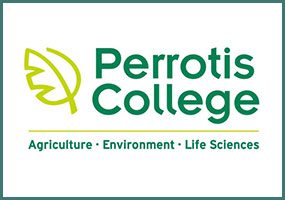History
Founded over a century ago, the American Farm School (AFS) serves students at the secondary, post-secondary and adult levels. AFS provides formal agricultural education as well as technical and professional training. It endeavors to prepare students for leadership roles in community life and to foster individual initiative, a spirit of enterprise, an appreciation of excellence, a lasting attitude of inquiry and the ability to work cooperatively.
The Perrotis College of Agriculture, Environment & Life Sciences, a branch of the American Farm School, was founded as a Laboratory of Free Studies in 1995 through an endowment from Mrs. Aliki Perroti in order to offer higher education programs for careers in the food and agricultural industries. In 2007, through a partnership with the Cardiff Metropolitan University the College began offering BSc (Hons) degrees.
Mission
As an institution of higher education, Perrotis College provides degree programs that are both research-based and practically oriented, and which respond to the public’s social, economic and environmental concerns. Perrotis College, as a division of the American Farm School, promotes equal opportunity for all students and employees, as well as for all applicants for admissions or employee positions, regardless of race, religion, gender or ethnicity. Servicing students from rural and urban Greece, south-eastern Europe, the European Union, the United States and worldwide, Perrotis College pursues the following educational goals:
• To enable students to learn and critically analyze contemporary information, methods and technology, and to share and apply their learning in the pursuit of professions rising out of agriculture, business, tourism and the food industry;
• To develop in students a strong theoretical and practical foundation in the agricultural, tourism and business disciplines in order for them to pursue graduate study or advanced training;
• To develop student skills and abilities in interpersonal leadership, communication, entrepreneurship, creativity, problem-solving and critical thinking;
• To foster in students an awareness of contemporary global issues, and sensitivity to cultural diversity and interdependence;
• To encourage graduates to become an integral part of their communities in order to offer contemporary learning, build networks and foster sustainable, productive living and working environments; and
• To encourage the pursuit of learning beyond the traditional college years in order to provide ongoing access to and dissemination of information, knowledge and skills that can contribute to an abundant food and fiber supply; promote the well being of individuals, families and communities; and enhance the sustainability of agricultural and economic systems.
